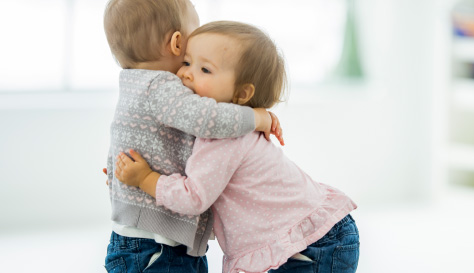Making friends, sharing and playing nicely with others
How can we help our toddlers make friends, share, play nicely and care for others? Is this even possible? Here’s some advice.
At a glance
- When toddlers get frustrated, stay calm and try distracting them
- Playing with others will help teach them key social skills
- Talk about 'taking turns' rather than sharing

When your baby looked in the mirror, all they saw was another human face staring back at them. But now they’re a toddler they look in the mirror and see themselves. They know they’re a separate person with their own name, their own likes and dislikes and their own feelings.
This is the beginning of the long journey towards becoming a well-adjusted, happy person who can make friends, take care of others, share, resolve conflicts and control their emotions.
(We can probably all think of adults who are still on the learning curve there, to be honest.)
Here’s how we can help:
Managing mood swings
Toddlers haven’t yet learned how to control their emotions, and mood swings can be alarmingly rapid and intense. But they are also – thankfully – short-lived, moving from screaming in frustration to smiling and playing within seconds. Staying calm, helping them with the source of frustration and using distraction techniques (‘oh look, a red leaf!’) will help them. Don’t expect miracles though – plenty of five-year-olds still have difficulty controlling their emotions.
Finding friends
Playing with others will help teach them key social skills such as how to be kind, to share and to resolve conflict. When organising playdates with younger toddlers, experienced mums advise keeping it to two, schedule it for after a nap, limit it to two hours and hide away any particularly special toys they won’t want their guest to dribble on.
However, it’s too early to expect them to play together: until around two and a half years old, they are more likely to play alongside each other (psychologists call this ‘parallel play’) or perhaps ignore each other altogether. It’s only when they get nearer three that they will begin to play directly with another child.
Helping them share
Frankly, this just isn’t going to happen. Sharing is a difficult concept to grasp – after all, they’ve only just realised they’ve got all these lovely new toys to play with, so why give them to someone else?
It can be tempting to step in on a playdate when they’re tussling over a toy and insist they share, but they won’t understand yet. Better – if you can – to stand back and let them solve a row themselves. Often the losing child will simply go off and find something else to play with (usually prompting the winning one to drop the prized toy and head off after the new one!).
It can help to talk about ‘taking turns’ rather than sharing. Set a time limit for playing with a toy before it’s their playmate’s turn (use a kitchen timer to remind them – and you). Help them get involved in something else in the meantime.
At home, you can gently teach the art of sharing by playing turn-taking games with your toddler (play catch and say ‘my ‘turn, ‘your turn’ etc) and sharing food (taking it in turns to take a bite out of a biscuit/banana).
Dealing with toddler groups
Some toddlers can’t wait to get out there and explore, with hardly a backward glance.
Others will stay glued to your side bursting into tears at the slightest noise and you’ll wonder why you bothered coming out at all.
Most toddlers need a little time to get used to a new social situation and will stay close to you and watch before they take part. Often they’ll go off for a short while and then return for contact and reassurance before moving off again. This is all normal.
If your toddler is anxious about social situations, start with a small, quiet group without too much going on and take it from there. Accept that the first couple of times they might not leave your side at all, but keep trying. When they do take the plunge and go off and play, make sure they can always see you and praise them when they come back to ‘touch base’.
Be patient – they’ll get there in the end.
Developing empathy
Understanding that other people have feelings too is a difficult concept for a toddler to grasp as they've only just got to grips with the idea of ‘me’ and ‘mine’.
Most won’t understand that others have their own thoughts and feelings until around two years old, old and their sense of empathy slowly builds up over several years.
We can help by talking to our toddlers about kindness, showing sympathy and care when teddies ‘get hurt’, playing role-play doctor/nurse games and talking to them about other people’s feelings if they've hurt or upset another child.
You can see more about your toddler's development with our milestones chart.